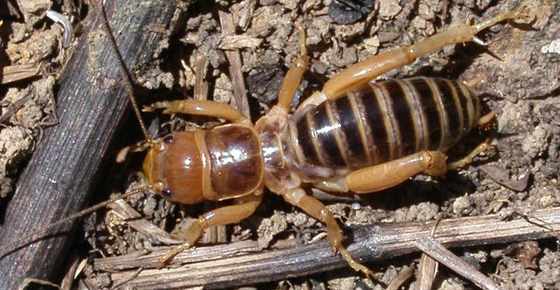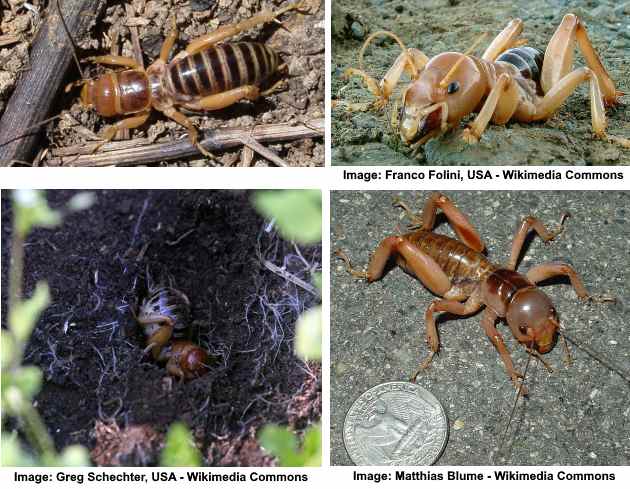Does a Potato Bug Bite? All the Facts about Potato Bug (Jerusalem Cricket)

Potato bug bites aren’t poisonous but they can be very painful and sore. The potato bug is also called Jerusalem cricket or child of the earth bug and it lives in the western United States and Mexico. These nocturnal large insects can get into your home and usually inflict a nasty bite if they feel threatened or cornered.
The potato bug (Jerusalem cricket) has orange and black stripes and if you find it in your garden or home, then you may want to get rid of it. Make sure to handle it properly to prevent getting bitten.
The name “potato bug” or “Jerusalem cricket” can be a bit confusing. These insects don’t gorge on potatoes, nor are they from Jerusalem. Other names for Jerusalem crickets are “child of the earth” (Spanish, niño de la tierra), skunk bugs, skull insects, earth baby, or shiny bug.
In this article, you will learn all about potato bugs and what to do if you find these nasty pests destroying plants in your yard.
The Jerusalem Cricket (Potato Bug) Bite
Potato bugs are not poisonous insects but they have strong jaws that can cause you to shriek in pain if they bite you. Jerusalem crickets use their strong jaws to dig into the earth, so it’s no wonder their bite is painful.
Potato bug bites may not be very common and they don’t inject venom. The pesky bugs are naturally shy creatures and scurry away from humans. Also, the large insects look pretty frightening and, because of that, most humans are quick to get rid of them.
Most potato bugs bite when you are least expecting it. Because they are often found under plant leaves, in flower beds, and amongst decaying plants, you might get bitten while gardening.
To help avoid getting a nasty bite from these giant ant-like creatures, it’s a good idea to wear gloves when gardening.
So, although a potato bug looks dangerous to humans, the worst that a Jerusalem cricket will do is inflict a non-toxic agonizing bite. The pain from the insect bite is usually transitory and should only last a few minutes.
To avoid the agony of getting bitten by a Jerusalem cricket bug, it’s helpful to know the warning signs when they are agitated. When a potato bug is getting ready to sink its teeth into you, it usually makes itself look bigger by lifting its back legs up. You may also hear hissing noises before it is about to pounce on your skin.
What Does a Potato Bug Bite Look Like?
If you are unfortunate enough to suffer a potato bug bite, the first sign will probably be a sharp stinging sensation. Most people say that the pain from a bite lasts a few minutes.
What does a Jerusalem cricket bite look like? Because there is not venom or poison in their bite, you shouldn’t see any significant swelling or redness. Some websites say that cricket bites could cause sores on your skin or an itchy rash.
Of course, you may have an allergic reaction to the painful potato bug bite and you should treat it appropriately.
How to treat a potato bug bite
To prevent an infection in the bite mark, it’s important to cleanse the affected area. Usually, warm water and soap are enough to get rid of any germs around the bite wound. If you experience pain and itching, then you could apply diluted apple cider vinegar to the irritated bite.
To treat potato bug bites, mix equal amounts of raw apple cider vinegar with water. Dip a cotton ball into the vinegar remedy and apply to the sore bite mark. Use 3 or 4 times a day until any pain, itchiness, or redness has gone.
What is Jerusalem Cricket (Potato Bug)?
Jerusalem crickets (Stenopelmatus fuscus) are large insects that look like a cross between a large ant and a fat wasp. Their ant-like appearance can look frightening to many people due to their large bulging head, small eyes, and long antennas.
One of the off-putting things about the appearance of these insect bugs is their large brown head that has a humanoid appearance. Their body has shiny orange and black bands with 3 large legs on either side.
Potato bugs are wingless creatures and get around on their 6 spider-like legs. Their legs help them dig into the ground where they spend much of their life. Unlike other crickets, Jerusalem crickets don’t jump.
Jerusalem crickets can grow up to 2.5 inches (6 cm). This means that these unsightly-looking cricket bugs can be nearly as long as the width of your hand. In fact, due to their unsightliness and size, people describe potato bugs as the monsters of the insect world.
Apart from giving you a nasty bite, Jerusalem bugs also give off a foul stench when they are threatened.
The way a potato bug looks is the reason it has adopted names like “skull insect,” “shiny bug,” “red-skull bug,” “dark Jerusalem crickets,” and “skunk bugs.”
Even though Jerusalem crickets or Jerusalem beetles are called potato bugs, they shouldn’t be confused with the Colorado beetle or Colorado potato beetle. In fact, no one really knows where the name of this unpleasant-looking creature came from.
One researcher theorized that a scientist called the beetle a Jerusalem cricket because it resembled the Jerusalem Cross. The name “potato bugs” could come from the fact that they are commonly found in potato fields. Because they are also found under stones, the term “stone crickets” is sometimes used. (1)
However, the good news is that they are not an aggressive insect. So, usually, if you leave them alone, they will leave you alone and not think about biting you.
Where is the Jerusalem Cricket (Potato Bug) Found?
Potato bugs inhabit areas in the western United States and Mexico. You may not see these unsightly bugs very often as they tend to live underground and usually come out at night.
If you live in areas where Jerusalem crickets are found, you may discover some in your flower beds, under leaves or stones, or in and around compost heaps. Gardeners often find lots of potato bugs when they are getting the soil ready for planting. Cultivating the soil can disturb the ground crickets.
Potato bugs bites are common when clearing away debris, old leaves, or working in the garden.
Because potato bugs can eat plants, most gardeners try and get rid of as many as possible of the menacing bugs before planting seeds and new plants.
What Do Potato Bugs Eat?
Potato bugs feed on dead roots, decaying plant matter, and other organic material. Despite their name, potato bugs don’t give any preference to gorging on potatoes.
One of the reasons why gardeners try to eradicate Jerusalem crickets from their land is because they can be harmful to growing plants, especially young ones. They love to suck the juices from the leaves and stems of fruits and vegetables. This can affect the growth of plants as the cricket leaves its toxic saliva behind. This saliva only causes harm to plants, but as potato bugs don’t have poison glands, they are not venomous.
However, many gardeners don’t view potato bugs as pests in the garden but as good for the soil. As the cricket bugs burr through the soil, they help to aerate it. Jerusalem crickets are also good for munching away at dead roots and other decaying organic material in your garden.
A lack of dead plant material to eat is usually the reason Jerusalem crickets start munching on your fresh, young plants in your garden.
How to Get Rid or Kill Potato Bugs
Thankfully, it is rare that you experience an infestation of potato bugs in your home. These garden bugs prefer the outdoors where they can feed on decaying plants.
Some of the signs that help you know that you need to get rid of potato bugs from your garden are hissing noises, wilted plants, stunted plants, or damaged flowerbeds.
Here are some natural ways to eradicate potato bugs and other harmful insects from your garden or yard.
How to kill potato bugs with diatomaceous earth
Diatomaceous earth (DE) is a non-toxic way to rid your garden of unwanted creepy-crawlies such as Jerusalem bugs.
You can safely use food grade diatomaceous earth dust around your garden to reduce the number of potato bugs. Diatomaceous earth is a natural powder from the fossilized remains of a type of algae.
According to the National Pesticide Information Center (NPIC), DE works by destroying the insect’s exoskeleton. This causes them to dry out and eventually die. Food grade DE is safe to use around the garden without fear of it causing damage to humans, pets, or your plants. (2)
One of the drawbacks of using diatomaceous earth to kill off Jerusalem potato bugs is that it’s not effective in wet or damp weather.
All you have to do is sprinkle the diatomaceous dust in areas where you see evidence of potato bugs. Repeat the application every few days and always reapply the non-toxic pesticide after rain when the soil has dried out.
Neem oil to get rid of potato bugs
Neem oil is another natural remedy to help get rid of Jerusalem crickets from your garden.
One of the reasons for using neem oil for potato bugs is that it is safe for humans and shows low toxicity to plants.
Research has shown that neem oil can help to combat various pest infestations. Neem oil helps to inhibit hormone function in many insects and affects their ability to reproduce and feed. (3)
Other studies have shown that natural neem oil insecticides have been effective in controlling pests such as the Colorado potato beetle, cockroaches, and other bugs. Neem oil also controls pest infestations by effectively killing of larvae before they hatch. (4)
To make your own potato bug killer home remedy, you can make an insecticidal spray this way:
- Fill a 500 ml (17 oz.) spray bottle ¾ full with water.
- Add 2 tablespoons of neem and one tablespoon of Castile soap.
- Shake well to thoroughly mix the ingredients.
- Spray on your plant leaves as needed.
- Reapply the natural potato bug insecticide every 2 days to help resolve a potato bug problem.
Remember that potato bug larvae are often found on the underside of leaves, so make sure and spray those parts of the plant.
Learn more about the many uses of neem oil and how you can use this natural pesticide to get rid of aphids.
How to Rid your Garden of Potato Bugs and Their Eggs
What else can you do if you have to get rid of these menacing insects from your garden? As well as using natural control methods, you can use a number of other ways to eradicate these monster insects.
Traps to get rid of Jerusalem crickets. You can make your own homemade potato bug traps by putting petroleum jelly on a small board. Place the traps where you suspect these nocturnal bugs are lurking. The potato bugs should stick to the trap if they walk on them. Discard any bugs you catch and keep placing the garden bug traps until you have none left.
Clearing your yard. Another way to get rid of potato bugs from your garden is to keep your yard free from debris. Remove dead leaves, dead grass, and other dead plant matter regularly from your yard. Help to prevent Jerusalem crickets from setting up home in your garden by storing firewood at least 5 cm from the ground and preventing trash from accumulating.

